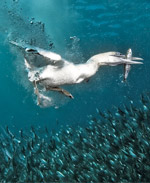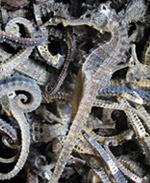- The importance of marine fish
- > Fish are a vital component of marine habitats. They are complexly related to other organisms – through the food web and through other mechanisms. Intensive fishing therefore results not only in the decimation of fish species but also affects entire biological communities. The results are often unpredictable. Although industrial fisheries rarely cause the complete eradication of individual species, they may already be having an evolutionary impact on heavily fished species.

The “big picture” in the ocean
Worldwide there are over 30,000 fish species. Sev-eral hundred of these are fished commercially. The species of commercial interest have long been regard-ed in isolation. The primary concerns for fisheries management have been merely the annual catch of a species and its presumed stock, from which the maximum catch for the next season is derived. The web of relationships in the ocean, however, is complex. Catching huge volumes of fish changes the entire habitat. The idea that entire ecosystems have to be taken into account if fish stocks are to be preserved over the long term is gradually becom-ing accepted. An improved and more sustained management of fish stocks in the future will require much more extensive investigations than have been previously carried out. One topic of interest is how phytoplankton, the basis of life in the ocean, proliferates in particular regions. The amount and composition of zooplankton, on which smaller fish species primarily feed, also play an important role. Although these kinds of complex ecosystem investigations have only been carried out for a few species so far, the gain in knowledge has been great. Furthermore, scientists are calling for accurate data on bycatch to be recorded at last. “Bycatch” refers to those fish and marine animals that unintentionally end up in the nets while fishing for particular species, and are usually thrown overboard dead. The numbers and composition of the bycatch can provide further important information about the ecological status of a marine region. The increase in joint international efforts to promote marine conservation in recent years is encouraging. The coastal regions of the world, for example, have been classified into Large Marine Ecosystems (LMEs), large-scale regions that span geopolitical borders. The LMEs produce 95 per cent of the global fish biomass. Hundreds of millions of people worldwide live near the coasts. This initiative should be effective in bringing together international experts, especially from developing and newly industrialized countries. The first positive indications of international ma-rine conservation projects between neighbouring countries have already been seen off south-west Africa and in the Gulf of Guinea. Fortunately, people will not be able to completely eliminate most of the commercially fished species. Fishing will become unprofitable before the stock is reduced to the point at which a species disappears. There are, however, some possible exceptions such as the sturgeon and certain species of tuna. Although some protection measures have now been introduced, such species could be annihilated in the coming years. The stock of sturgeon, in particular, has already been so weakened by fishing and habitat degradation that the species probably cannot be saved. It is also disturbing that industrial fishing prob-ably alters the evolution of certain species. Large fish are fished out while small individuals become more predominant. Under intensive fishing, being small apparently gives the individual fish an evolutionary advantage. The consequences of this fish-eries-induced evolution cannot be foreseen. There are strong indications that fish stocks of small, young-reproducing fish are less stable than stocks with large animals that reach sexual maturity later. Computer models indicate that these human-induced changes will take centuries to reverse, if at all. The precondition will be that humans catch fish with more foresight in the future, and reduce pressure on the species.

